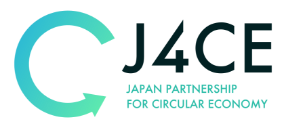Yokohama Food Recycle Project
[Company / organization] Yokohama Food Recycle Project
Members and Roles, Cooperation points (Fig. 1)
(JFE Engineering Group)
- JFE Engineering Corp.: Design, Construction and Project Management
- J&T Recycling Corp.: Sales and Collecting
- Urban Energy Corp.: Electricity Retailing
(East Japan Railway Group)
- East Japan Railway Company: Project Management
- JR East Environment Access Co., Ltd.: Sales and Collecting
(Joint Venture)
- J Bio Food Recycle Corp.: Operation and Development
JR East Group operates retailing facilities in and around stations. Those facilities in Metropolitan area including Kanagawa discharge about 50t food waste per day, but recycling ratio was only 40%. On the other hand, JFE Engineering Group has the construction track records of biogas power plants with methane fermentation technology and waste treatment technology. J Bio Food Recycle was established with the aim of “Increasing food waste recycle” and “Creating environmental friendly energy” by these two groups. Then, adding Urban Energy Corp, JFE Engineering and JR East Groups could build a local circular network.
Start Operation
August 2018
Technology and Business Model (Fig. 2, 3)
① Biogas Generation by Food Waste
Decomposing food waste using microorganisms to form methane gas and then generating electricity with gas engines. It contributes “Reducing CO2” and “Improving food waste recycling ratio” to the achievement of SDG’s.
② Recycling loop of electricity
Collaborating with Urban Energy, waste generators can purchase discounted rate electricity equivalent to the amount of their food waste which generated to J Bio. This returning profit system through electricity is the first recycling loop in Japan.
Eg. Pacific Convention Plaza Yokohama (Pacifico Yokohama)
Kawasaki King Sky Front Tokyu REI Hotel
③ Hiring electric garbage trucks/waste collection vehicles
Using JFE Engineering group’s EV vehicle, which developed and owned by J&T Recycling, for collecting waste (part of collection). Batteries are charged to use generated in J Bio Food Recycle and build a collection model with waste recycled energy.
Achievement and Goals
<Achievement (by March 2021)>
- Treating food waste about 65t/day (70% of operation maximum)
① Reducing CO2: 11,443t in total since Aug. 2018, 2 years 8 months
② Increasing food recycling: Contributing 37 companies (109 shops) of JR East Group and other waste generators, 214 companies. (eg. Tetsudokaikan co., Ltd. (currently JR East Cross Station co., Ltd.) increases food recycling ratio from 33% to 66%)
<Goals>
- Reach 100% operation (up to 80t/day) in FY2021
- Contributing SDG’s goal, approaching from “Reducing CO2” and “Food Waste Recycling improvement”
URL
- Recycle
- Renewable
- End-of-use
- Food
- Company in different category.
- Case/initiative by multiple companies/ organisations




